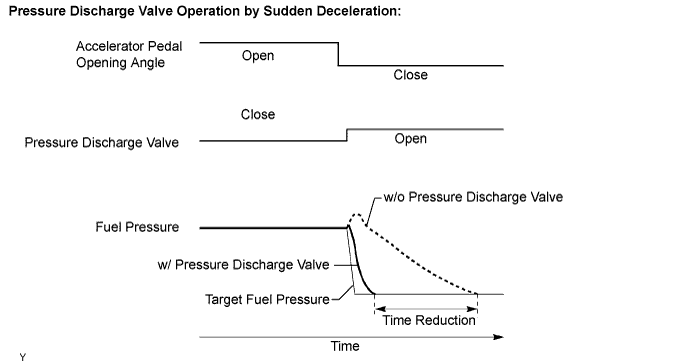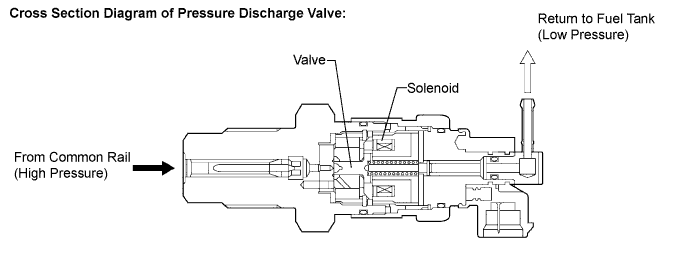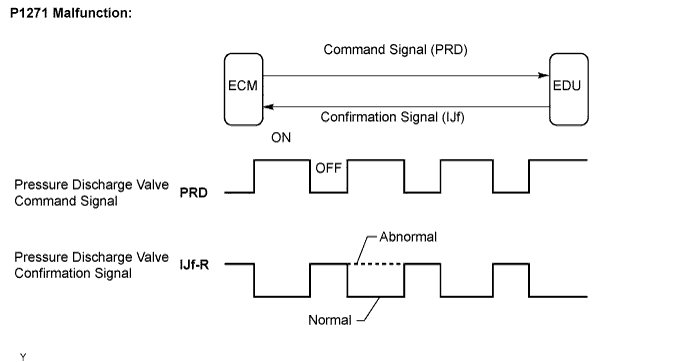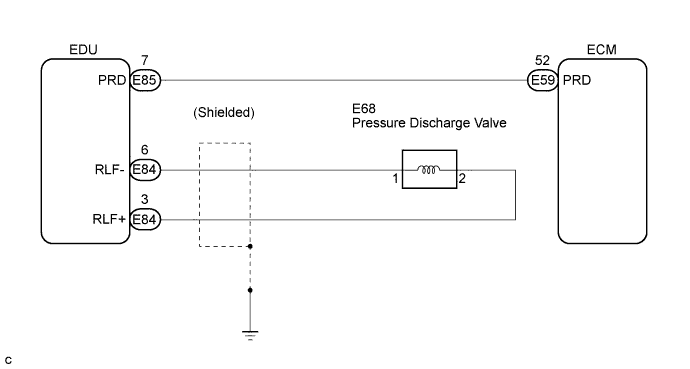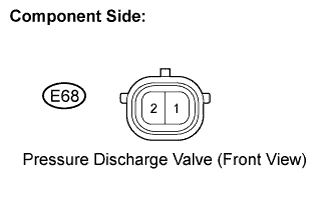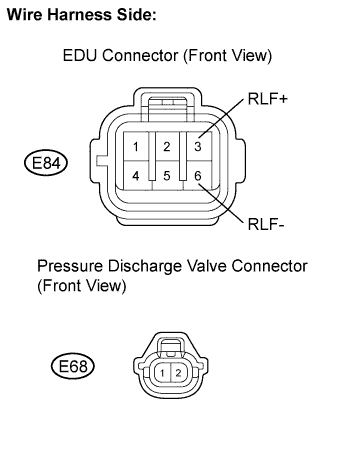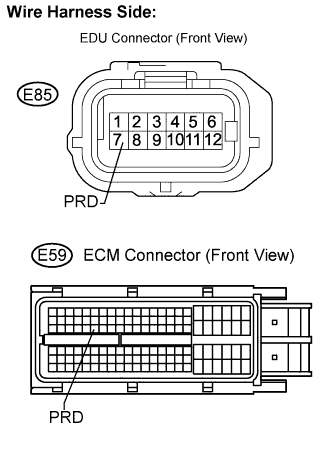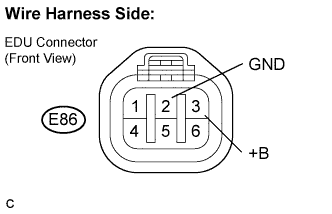Dtc P1271 Fuel Regulator Circuit Malfunction (Edu Drive)
Engine. Lexus Is250, Is220D. Gse20 Ale20
DESCRIPTION
MONITOR DESCRIPTION
MONITOR STRATEGY
TYPICAL ENABLING CONDITIONS
TYPICAL MALFUNCTION THRESHOLDS
WIRING DIAGRAM
INSPECTION PROCEDURE
READ DTC OUTPUT
INSPECT COMMON RAIL ASSEMBLY (PRESSURE DISCHARGE VALVE)
CHECK HARNESS AND CONNECTOR (PRESSURE DISCHARGE VALVE - EDU)
CHECK HARNESS AND CONNECTOR (ECM - EDU)
INSPECT EDU (POWER SOURCE CIRCUIT)
REPLACE EDU
CHECK IF DTC OUTPUT RECURS (SEE IF DTC IS OUTPUT AGAIN)
REPLACE COMMON RAIL ASSEMBLY
DTC P1271 Fuel Regulator Circuit Malfunction (EDU Drive) |
DTC P1272 Fuel Pressure Regulator Malfunction |
DESCRIPTION
The ECM controls the internal fuel pressure of the common rail by opening and closing the pressure discharge valve. When sudden deceleration occurs, the internal fuel pressure will temporarily become higher than usual and combustion noise may result. Therefore the ECM will open the valve temporarily to discharge the excess pressure inside the common rail. Also, the pressure discharge valve opens when the engine switch is turned OFF to allow prompt discharge of the common rail internal pressure.- HINT:
- For more information on the pressure discharge valve and the common rail system (Click here).
- For more information on the EDU (Click here).
- If P1271 and/or P1272 is present, refer to the DTC chart for the fuel system (Click here).
DTC No.
| DTC Detection Condition
| Trouble Area
|
P1271
| Open or short in pressure discharge valve circuit.
There is no valve opening confirmation (IJf) signal from EDU to ECM despite the ECM sending valve opening command (PRD) signal after the engine is started.
(1 trip detection logic)
| - Open or short in pressure discharge valve circuit
- Open or short in pressure discharge valve itself
- EDU
- ECM
|
P1272
| Pressure discharge valve closed malfunction.
Actual pressure decreasing rate deviates from the simulated pressure decreasing rate after the engine switch is turned OFF.
(2 trip detection logic)
| - Open or short in pressure discharge valve circuit (P1271 is set simultaneously)
- Pressure discharge valve
- Supply pump
- ECM
|
- HINT:
- After confirming DTC P1271 and/or P1272, check the fuel pressure inside the common rail in the "Powertrain / Engine / Data List / Fuel Press" using the intelligent tester.
- P1271:
After clearing the DTC, drive the vehicle at 50 km/h (31 mph) with the third gear and then decelerate by releasing the accelerator pedal. Check that P1271 is not present.
- P1272:
After clearing the DTC, start and stop the engine twice, and then confirm that P1272 is not present.
Reference:Engine Speed
| Fuel Pressure (MPa)
|
Idling
| Approximately 37 to 43
|
2,500 rpm (No engine load)
| Approximately 60 to 66
|
MONITOR DESCRIPTION
- P1271 (Open or short in pressure discharge valve circuit):
This DTC will be set if there is no valve opening confirmation (IJf) signal sent from the EDU to the ECM even though the ECM has commanded the EDU to open the pressure discharge valve. This DTC refers to an open or short circuit malfunction of the pressure discharge valve circuit, not a malfunction that includes a valve that is stuck open or closed.
The EDU monitors the current supplied to the pressure discharge valve to verify that the current flows into the valve. If the current exceeds the specified level, the EDU determines that the IJf signal is low. If this DTC is present, the ECM enters the fail-safe mode and limits engine power. The fail-safe mode continues until the engine switch is turned OFF.
- P1272 (Closed malfunction of the pressure discharge valve):
The pressure discharge valve will open and discharge the internal fuel pressure from the common rail to the fuel tank when the engine switch is turned OFF. In this event, the ECM compares the actual drop rate of the internal fuel pressure and the target drop rate. If the ECM judges the actual drop rate is smaller than the target, the ECM then judges that the valve has stuck closed and sets this DTC. This DTC will be stored if the internal fuel pressure does not drop to the target after the engine switch has been turned OFF.
If this DTC is present, the ECM enters a fail-safe mode and limits engine power. The fail-safe mode continues until the engine switch is turned OFF.
MONITOR STRATEGY
P1271:Required sensors
| EDU
|
Frequency of operation
| Continuous
|
Duration
| 3 seconds
|
CHK ENG operation
| 1 driving cycle
|
P1272:Required sensors
| Fuel pressure sensor
|
Frequency of operation
| Once per driving cycle
|
Duration
| 1 second
|
CHK ENG operation
| 2 driving cycles
|
TYPICAL ENABLING CONDITIONS
P1271:Specification
|
Drive the vehicle at 50 km/h (31 mph) in 3rd gear and then decelerate by completely releasing the accelerator pedal
|
P1272:Item
| Specification
|
Minimum
| Maximum
|
Fuel pressure
| 30 MPa (306 kgf/cm2, 4,351 psi)
| -
|
Fuel temperature
| 0°C (32°F)
| -
|
Battery voltage
| 11 V
| -
|
The monitor will not run if the fuel pressure sensor, pressure discharge valve circuit, or fuel temperature sensor is malfunctioning
|
TYPICAL MALFUNCTION THRESHOLDS
P1271:Specification
|
There is no confirmation signals from the EDU, despite the ECM sending the command signals regularly during deceleration
|
P1272:Specification
|
The internal pressure stays beyond the specified level after the engine switch was turned OFF
|
WIRING DIAGRAM
INSPECTION PROCEDURE
- NOTICE:
- After replacing the ECM, the new ECM needs registration (Click here) and initialization (Click here).
- HINT:
- After completing repairs, confirm that P1271 and/or P1272 does not recur.
- If P0200 and P1271 are present simultaneously, there is an open circuit in the INJF wire harness between the EDU and ECM, or in the wire harness for both injector and pressure discharge valve.
Connect the intelligent tester to the DLC3.
Turn the engine switch ON (IG) and turn the intelligent tester ON.
Enter the following menus: "Powertrain / Engine / DTC".
Read DTCs.
- Result:
Display (DTC output)
| Proceed to
|
P1271 or P1271 and P1272
| A
|
P1272
| B
|
| 2.INSPECT COMMON RAIL ASSEMBLY (PRESSURE DISCHARGE VALVE) |
Disconnect the E68 pressure discharge valve connector.
Measure the resistance between the terminals of the pressure discharge valve.
- Standard resistance:
Condition
| Specified Condition
|
20°C (68°F)
| 0.85 to 1.05 Ω
|
Reconnect the pressure discharge valve connector.
| | REPLACE COMMON RAIL ASSEMBLY |
|
|
| 3.CHECK HARNESS AND CONNECTOR (PRESSURE DISCHARGE VALVE - EDU) |
Disconnect the E84 EDU connector.
Disconnect the E68 pressure discharge valve connector.
Check the resistance between the wire harness side connectors.
- Standard resistance (Check for open):
Tester Connection
| Specified Condition
|
RLF+ (E84-3) - (E68-2)
| Below 1 Ω
|
RLF- (E84-6) - (E68-1)
| Below 1 Ω
|
- Standard resistance (Check for short):
Tester Connection
| Specified Condition
|
RLF+ (E84-3) or - (E68-2) - Body ground
| 10 kΩ or higher
|
RLF- (E84-6) or (E68-1) - Body ground
| 10 kΩ or higher
|
Reconnect the EDU connector.
Reconnect the pressure discharge valve connector.
| | REPAIR OR REPLACE HARNESS OR CONNECTOR |
|
|
| 4.CHECK HARNESS AND CONNECTOR (ECM - EDU) |
Disconnect the E85 EDU connector.
Disconnect the E59 ECM connector.
Check the resistance between the wire harness side connectors.
- Standard resistance (Check for open):
Tester Connection
| Specified Condition
|
PRD (E85-7) - PRD (E59-52)
| Below 1 Ω
|
- Standard resistance (Check for short):
Tester Connection
| Specified Condition
|
PRD (E85-7) or PRD (E59-52) - Body ground
| 10 kΩ or higher
|
Reconnect the EDU connector.
Reconnect the ECM connector.
| | REPAIR OR REPLACE HARNESS OR CONNECTOR |
|
|
| 5.INSPECT EDU (POWER SOURCE CIRCUIT) |
Disconnect the E86 EDU connector.
Turn the engine switch ON (IG).
Measure the voltage between the specified terminals of the EDU connector.
- Standard voltage:
Tester Connection
| Specified Condition
|
+B (E86-3) - GND (E86-2)
| 9 to 14 V
|
Reconnect the EDU connector.
| | CHECK EDU POWER SOURCE CIRCUIT (EDU - BATTERY) |
|
|
| 7.CHECK IF DTC OUTPUT RECURS (SEE IF DTC IS OUTPUT AGAIN) |
Connect the intelligent tester to the DLC3.
Turn the engine switch ON (IG) and turn the tester ON.
Clear DTCs.
Start the engine.
Enter the following menus: Powertrain / Engine / DTC.
Read the DTCs using the intelligent tester.
- Result:
Display (DTC output)
| Proceed to
|
P1271 and/or P1272
| A
|
No output
| B
|
| 8.REPLACE COMMON RAIL ASSEMBLY |
| NEXT |
|
|
|
| CHECK IF DTC OUTPUT RECURS |
|
